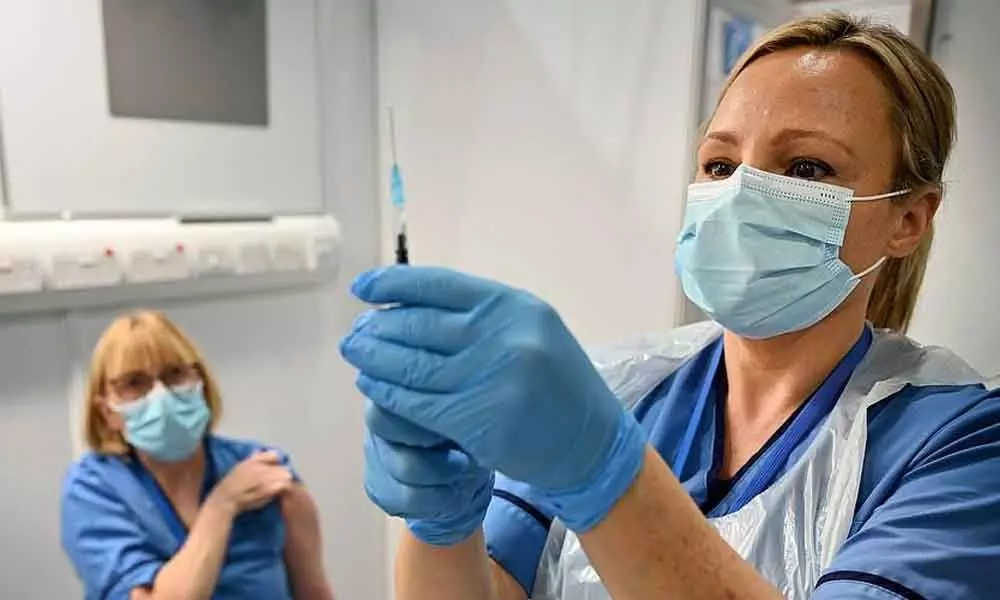Pfizer vaccine 'allergic'

Pfizer vaccine ‘allergic’
Regulators in UK urge people with history of significant allergies not to have Pfizer injection as 2 NHS staff given jab suffer reaction
London: The UK's world-first Covid-19 vaccine rollout has hit problems within 24 hours after anyone with a serious allergy to medicines or food was told not to have the Pfizer jab because two National Health Service (NHS) staff fell ill just after being vaccinated on V-Day.
The number of people set to be barred is not known, but up to 7million people in Britain have allergies severe enough to require medical care, according to the NHS, while around 250,000 people need to carry an EpiPen at all times.
Britain's Medicines and Healthcare products Regulatory Agency (MHRA) gave precautionary advice to all 50 NHS trusts now vaccinating the population that anyone who has a history of 'significant' allergic reactions should not receive the vaccine.
Professor Stephen Powis, national medical director for the NHS in England, said: 'The MHRA have advised on a precautionary basis that people with a significant history of allergic reactions do not receive this vaccination after two people with a history of significant allergic reactions responded adversely yesterday. Both are recovering well.'
Both the unnamed healthcare workers needed immediate treatment but are 'recovering well' after they developed symptoms shortly after receiving the jab on the first day of Britain's biggest ever mass vaccination programme yesterday.
It is not known if either person needed to use the EpiPens they both carry with them at all times.
Despite the two allergy cases the Government is today continuing to vaccinate between 5,000 and 7,000 people per day across the UK with 800,000 Pfizer doses already in hospitals and millions more on the way.
The two NHS staff suffered an anaphylactoid reaction to the vaccine, which is milder than anaphylaxis, and tends to involve a rash, shortness of breath, swelling of the face and tongue or a drop in blood pressure, the NHS says.
In the US vaccine trial carried out by Pfizer, 137 out of around 19,000 people given the vaccine had one or more of these reactions. But 111 who got the placebo also had allergic reactions.
Reactions to the jab can include a temperature, nausea, swelling of the arm or in severe cases feeling generally unwell with swollen lymph node glands. A Pfizer spokesman said: 'We have been advised by MHRA of two yellow card reports that may be associated with allergic reaction due to administration of the COVID-19 BNT162b2 vaccine.
'As a precautionary measure, the MHRA has issued temporary guidance to the NHS while it conducts an investigation in order to fully understand each case and its causes. Pfizer and BioNTech are supporting the MHRA in the investigation.
'In the pivotal phase 3 clinical trial, this vaccine was generally well tolerated with no serious safety concerns reported by the independent Data Monitoring Committee.
The trial has enrolled over 44,000 participants to date, over 42,000 of whom have received a second vaccination'. The allergy scare came hours after Britain's drug regulator dismissed safety fears over the Pfizer and BioNTech coronavirus vaccine after a report revealed four people in a trial in the US got Bell's palsy. The condition, which is usually temporary, causes muscles on one side of the face to droop because of nerves not working properly.
Four cases of it were found in a group of 21,720 people who had the Pfizer vaccine in a trial in the US, compared to none among 21,728 people given a placebo vaccine. But this rate of occurrence is no different to how often it would be expected to happen in a random population, the company said.















